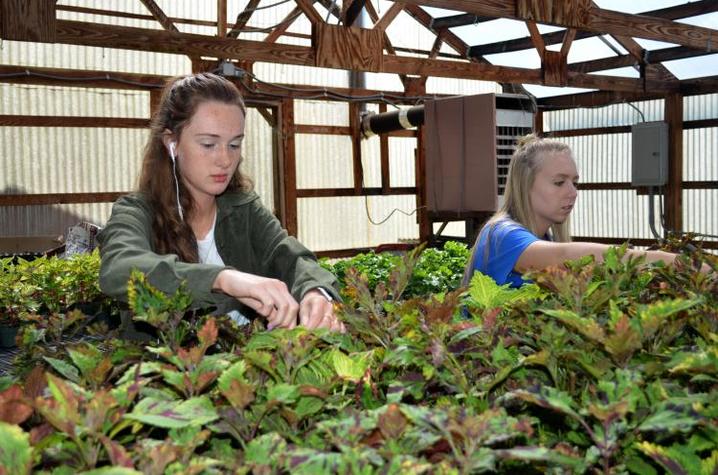Mini Farm Bringing Agriculture Back to Eastern Kentucky Community

SANDY HOOK, Ky. (May 30, 2019) — A mini farm at Elliott County High School is teaching students business and entrepreneurship skills they can use in their future careers and showing residents how they can use agriculture to improve their lives.
The mini farm is a project of Gary Selby, the high school’s agriculture teacher, and Keith Center, an agent with the University of Kentucky Cooperative Extension Service. They started the project to rekindle interest in agriculture among the county’s young people. After a six-year absence, the school system reinstated agriculture education in the high school in 2015. Two years ago, Selby became the high school’s first full-time agriculture teacher in many years.
“Even though we are in Appalachia, our local knowledge of agriculture is diminishing,” Selby said. “This project lets students know a little more about where their food comes from and builds up their work ethic, which is something they can use throughout life.”
Their first project was to get the high school’s greenhouse functional again. Selby applied for a grant to repair the greenhouse roof and included Center, the county’s agriculture and natural resources extension agent, on the grant as a community partner.
Since then, the project has grown to cover most of the three acres behind the Elliott County Schools complex that includes three of the county’s schools. As the project progressed, Center and Selby relied on the expertise of many UK College of Agriculture, Food and Environment experts on crop site selection, facility design and educational information.
“Mr. Selby had a background as an extension agent in West Virginia and knew what the UK Cooperative Extension Service and the College of Agriculture, Food and Environment could offer our students and community,” Center said. “We have several UK specialists including John Strang, Josh Jackson, Gregg Rentfrow and Ken Culp who have helped us get to where we are.”
In addition to the greenhouse, the mini farm includes a compost demonstration facility and areas for growing shitake mushrooms, blueberries and raised bed gardens. All are either highly popular in Eastern Kentucky or can be implemented on limited acreage. Grants from the Kentucky FFA Foundation have helped fund many of the projects.
By working at the farm, the students learn not only how to grow and harvest a variety of crops but also about the economics of having a business and how gardening can save on grocery costs, which is critically important in the economically strapped county.
“I have learned about writing grants and business proposals and even presented them to the principal to ask for permission on some of the things we have done,” said Marissa Mayse, high school senior and FFA president who plans to pursue a career in agricultural law. “It has given us skills we can use for whatever career field we might go into.”
The number of students participating in agricultural education has increased from 30 in 2015 to more than 100 this year.
The students sell all the crops to the community. It’s a source of fresh produce that many residents appreciate as fresh options are limited in Sandy Hook. The town’s only sources of food are a small grocery store and a seasonal farmers market. The nearest large grocery retailer is at least 30 minutes away.
High school freshman Taylor Whitley has taken the project a step further. This year will be his second season selling produce at the Elliott County farmers market as the market’s youngest seller. He has gone through Kentucky Proud and Appalachia Proud certifications, Good Agriculture Practices and Produce Best Practices trainings and is an authorized vendor through WIC Farmers Market Nutrition and Senior Farmers Market Nutrition programs.
“Mr. Keith and Mr. Selby have helped me a whole lot,” said Whitley, who will be FFA treasurer next year and is also a 4-H member. “I grew up on a farm, but they taught me how to grow my produce and sell it, so I can earn some extra money.”
Not only is it a hands-on laboratory for the students, but Center has used the facility as a demonstration site for the county’s producers.
“This project not only shows off our students’ abilities to the community, but it shows our producers that they can successfully incorporate modern agricultural concepts into their operations,” Center said.
The mini farm will continue to evolve. Selby and Center are repairing another existing structure that will serve as a livestock barn on the property. Future plans include adding goats, sheep and cattle and demonstrating how to use rotational strip grazing to get the most use out of available forages.




